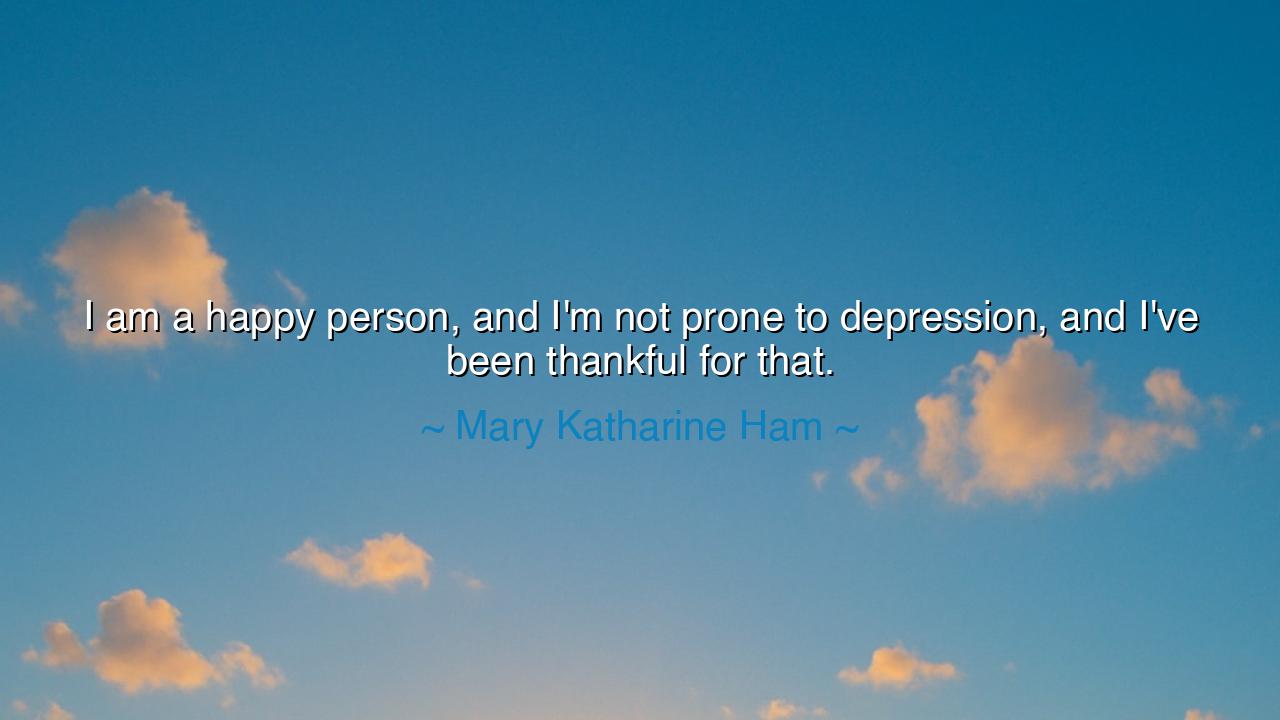
I am a happy person, and I'm not prone to depression, and I've






Hear the words of Mary Katharine Ham, spoken with clarity and gratitude: “I am a happy person, and I’m not prone to depression, and I’ve been thankful for that.” These words may appear simple, but within them lies a profound acknowledgment of the mystery of the human spirit. Happiness, so often chased, so often longed for, is here revealed not as a fleeting accident, but as a natural state of her being. And what is more, she does not boast of it, nor treat it as her own accomplishment—she is thankful, for she recognizes that such a disposition is not given to all, and that it is a gift to be cherished with humility.
The ancients understood that the balance of the soul was among the greatest treasures of life. Aristotle taught of eudaimonia, the flourishing life, not merely the pursuit of pleasure but the harmony of character and virtue. To be naturally inclined toward happiness, as Ham declares herself to be, is to walk more easily along that path of flourishing. But she also recognizes, as the wise always do, that others are not granted such ease, that the shadow of depression falls heavily upon many hearts. Thus, her words are not only self-reflection but also an offering of gratitude for being spared that particular burden.
Consider the story of Abraham Lincoln, one of the greatest leaders in history, who carried within him a melancholy so deep that many around him feared for his life. Yet from that darkness he drew compassion, wisdom, and the strength to guide a nation through its bloodiest war. Where Lincoln bore the weight of sorrow and transformed it into greatness, Ham bears the gift of natural happiness and transforms it into thankfulness. Each path is different, yet both reveal the same truth: the soul’s disposition is not of our choosing, but of our stewardship.
Her words also call us to humility. Too often, those who live in joy assume that happiness is earned by effort alone, or that those who struggle with sadness are weak. But Ham’s statement is different. She does not credit herself with mastery over mood; she gives thanks. Gratitude is the bridge between joy and compassion, reminding the fortunate that their light is not for pride, but for service. To be thankful for happiness is to recognize it as a gift, and to remember those who fight battles unseen.
The origin of such a statement lies in a life of perspective. Only one who has walked through storms—or seen others endure them—can say with such weight, “I have been spared, and I give thanks.” For happiness without gratitude becomes complacency, but happiness with gratitude becomes strength, a light not only for oneself but for others still struggling in shadow.
The lesson, then, is clear: if you are blessed with a joyful spirit, be thankful, and let your joy be a source of strength to those around you. Do not treat it as entitlement, but as a responsibility. And if you are one who struggles with depression, know this: even the happiest among us are not untouched by life’s trials, and though your path may be steeper, your endurance carries its own nobility and its own lessons for the world.
Practical wisdom follows: cultivate gratitude daily, whether for happiness or for the resilience to endure sorrow. Speak openly, as Ham has done, acknowledging the blessings you carry. Offer encouragement to others, for your light may be the spark that steadies another’s weary steps. And if happiness is your gift, do not hoard it—share it, for joy grows greater the more it is given away.
Thus, Mary Katharine Ham’s words stand not as idle reflection but as timeless teaching: “I am a happy person… and I’ve been thankful for that.” They remind us that happiness is both mystery and miracle, that gratitude is the guardian of joy, and that in acknowledging our blessings we become part of the eternal chain of hope. Be thankful for your light, bear it humbly, and let it shine for others still wandering in the dark.






AAdministratorAdministrator
Welcome, honored guests. Please leave a comment, we will respond soon